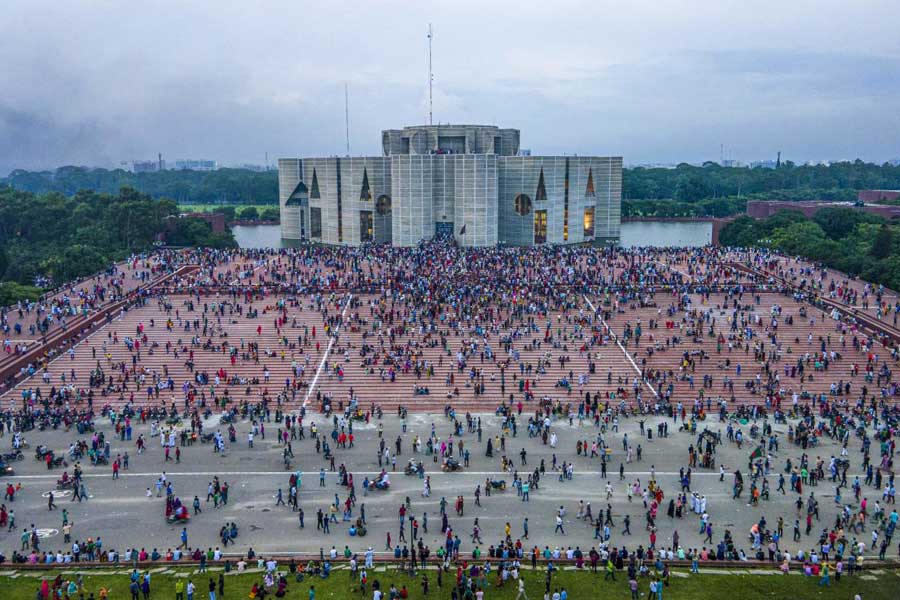India is "deeply concerned" over the situation in Bangladesh, especially about the status of the minority communities, and is in regular touch with authorities in Dhaka, External Affairs Minister S Jaishankar said on Tuesday, a day after Prime Minister Sheikh Hasina resigned and landed at the Hindon airbase near Delhi.
In India's first reaction to the dramatic developments in Bangladesh, Jaishankar, in suo-motu statements in both houses of Parliament, said Hasina decided to resign after a meeting with leaders of the security establishment and requested for approval "at very short notice" to come to India "for the moment".
"We are also monitoring the situation with regard to the status of minorities. There are reports of initiatives by various groups and organizations to ensure their protection and well-being," he said.
"We welcome that, but will naturally remain deeply concerned till law and order is visibly restored. Our border guarding forces have also been instructed to be exceptionally alert in view of this complex situation," he added.
Top sources said India has already reached out to the new dispensation in Dhaka and sought safety and well-being of over 10,000 Indians presently residing in Bangladesh.
It is learnt that New Delhi has conveyed to 76-year-old Hasina that she can stay in India till her travel plans for taking refuge in another country is finalised.
Though Hasina, who is accompanied by her sister Sheikh Rehana, wanted to travel to London, the UK is understood to have conveyed that it is unlikely to heed to her request for asylum. Following this, she is considering several options including the UAE, the US, Belarus, Qatar, Saudi Arabia and Finland, said a source.
In his remarks in Parliament, Jaishankar said India-Bangladesh relations have been "exceptionally close" for many decades over many governments, adding concern about recent violence and instability in that country is shared across the political spectrum.
Delving into the developments leading up to Hasina's resignation following weeks of students' protests, he said New Delhi had "repeatedly counselled restraint and urged that the situation be diffused through dialogue".
"We are in close and continuous touch with the Indian community in Bangladesh through our diplomatic missions. There are an estimated 19,000 Indian nationals there, of which about 9,000 are students," he said.
The external affairs minister said the bulk of the students have already returned to India in the month of July, adding it is India's expectation that the host government will provide the required security protection to the Indian missions in Bangladesh.
Hasina, who ruled the South Asian country with an iron fist for 15 years, resigned as the prime minister on Monday following massive protests that initially began as an agitation against a job quota scheme but weeks later morphed into a mass movement demanding her ouster from power.
Jaishankar said India is looking forward to the normal functioning of the Indian missions once the situation stabilizes.
"In terms of our diplomatic presence, in addition to the High Commission in Dhaka, we have Assistant High Commissions in Chittagong, Rajshahi, Khulna and Sylhet," he said.
The external affairs minister also touched upon the dramatic developments in Bangladesh.
"On August 4, events took a very serious turn. Attacks on police, including police stations and government installations, intensified even as overall levels of violence greatly escalated," he said.
"Properties of individuals associated with the regime were torched across the country. What was particularly worrying was that minorities, their businesses and temples also came under attack at multiple locations. The full extent of this is still not clear," he said.
Jaishankar said that on August 5, demonstrators converged in Dhaka despite the curfew.
"Our understanding is that after a meeting with leaders of the security establishment, Prime Minister Sheikh Hasina apparently made the decision to resign," he said.
"At very short notice, she requested approval to come for the moment to India. We simultaneously received a request for flight clearance from Bangladesh authorities. She arrived yesterday evening in Delhi," he added.
Jaishankar described the situation in Bangladesh as "still evolving".
"The Army Chief, General Waker-uz-Zaman, addressed the nation on August 5. He spoke about assuming responsibility and constituting an interim government," Jaishankar said.
Talking about the genesis of the problem in the neighbouring country, he said there has been "considerable tensions, deep divides and growing polarisation" in Bangladesh politics since the January parliamentary polls.
"This underlying foundation aggravated a student agitation that started in June this year. There was growing violence, including attacks on public buildings and infrastructure, as well as traffic and rail obstructions," he said.
"The violence continued through the month of July. Throughout this period, we repeatedly counselled restraint and urged that the situation be defused through dialogue. Similar urgings were made to various political forces with whom we were in touch," he said.
"Despite a Supreme Court judgement on July 21, there was no let-up in the public agitation. Various decisions and actions taken thereafter only exacerbated the situation. The agitation at this stage coalesced around a one-point agenda, that is that the Prime Minister Sheikh Hasina should step down," he said.
Except for the headline, this story has not been edited by The Telegraph Online staff and has been published from a syndicated feed.













